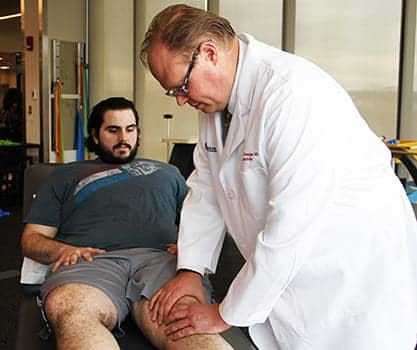
Study author Dr David Flanigan examines meniscus repair patient Steven Doukides 3 months postsurgery. (Photo courtesy of The Ohio State University Wexner Medical Center)
Among patients who underwent a meniscus repair surgical procedure, their risk of failure was no different whether or not their body mass index (BMI) was over or under 25, according to a recent study.
“Logically thinking about it, they’re carrying a greater load. That load is even greater across the knee joint, and we know higher loads across the knee joint can cause increased risk of arthritis,” says Dr David Flanigan, orthopaedic surgeon at The Ohio State University Wexner Medical Center and lead author of the study. “So our thought process was that increased load would be detrimental to a repair.”
After following more than 400 patients for 2 years postsurgery, Flanigan and his team suggest that heavier patients (those with a BMI over 25) had no greater risk of their meniscus repair surgery failing than lighter patients (those with BMIs under 25).
“This tells us that we should not consider weight as a factor when deciding if a patient is a good candidate for repair surgery,” Flanigan adds. “If a meniscus is repairable and surgery is appropriate for that patient, you can do the surgery and they would have the same success as someone who is not as heavy.”
[Source: The Ohio State University Wexner Medical Center]




